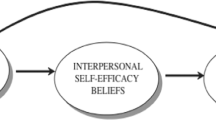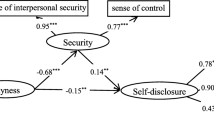Abstract
The aim of the current study was to examine whether self-efficacy mediated the associations between shyness and subjective well-being, and the universality and specificity of this mediated effect between the different groups in demographic factors, e.g., gender, only children and non-only children, urban and rural in a sample of Chinese college students. We had 311 university students, with age range of 18–24 respond to self-report measures by using the paper and pencil assessments including Cheek and Buss shyness scale, general self-efficacy scale, positive affect and negative affect scale and satisfaction with life scale. Results of structural equation modeling showed fully mediated effect of self-efficacy in the relationship between shyness and life satisfaction, and partially mediated effect of self-efficacy in the relationship between shyness and positive and negative affect. Moreover, multi-group analyses found that the paths did not differ by only children and non-only children, urban and rural, but shyness was more strongly associated with males’ self-efficacy, compared to females. Implications and limitations of the findings are discussed.


Similar content being viewed by others
References
Abele, A. E., & Spurk, D. (2009). The longitudinal impact of self-efficacy and career goals on objective and subjective career success. Journal of Vocational Behavior, 74(1), 53–62.
Akaike, H. (1987). Factor analysis and AIC. Psychometrika, 52, 317–332.
Anderson, J. C., & Gerbing, D. W. (1988). Structural equation modeling in practice: a review and recommended two-step approach. Psychological Bulletin, 103, 411–423.
Arbuckle, J. L. (2003). AMOS 5.0 update to the AMOS user’s guide. Chicago, IL: Smallwaters.
Baker, L., & McNulty, J. K. (2010). Shyness and marriage: does shyness shape even established relationships? Personality and Social Psychology Bulletin, 36, 665–676.
Bandura, A. (1977). Self-efficacy: toward a unifying theory of behaviour change. Psychological Review, 84, 199–215.
Brown, K. M., Hoye, R., & Nicholson, M. (2012). Self-esteem, self-efficacy, and social connectedness as mediators of the relationship between volunteering and well-being. Journal of Social Service Research, 38(4), 468–483.
Browne, M. W., & Cudeck, R. (1993). Alternative ways of assessing model fit. Newbury Park: Sage.
Caprara, G. V., Regalia, C., & Bandura, A. (2002). Longitudinal impact of perceived self-regulatory efficacy on violent conduct. European Psychologist, 7, 63–69.
Caprara, G. V., & Steca, P. (2005). Affective and social self-regulatory efficacy beliefs as determinants of positive thinking and happiness. European Psychologist, 10, 275–286.
Caprara, G. V., Steca, P., Cervone, D., & Artistico, D. (2003). The contribution of self-efficacy beliefs to dispositional shyness: on social-cognitive systems and the development of personality dispositions. Journal of Personality, 71, 943–970.
Cheek, J. M., & Buss, A. H. (1981). Shyness and sociability. Journal of Personality and Social Psychology, 41, 330–339.
Cohen, K., & Cairns, D. (2012). Is searching for meaning in life associated with reduced subjective well-being? Confirmation and possible moderators. Journal of Happiness Studies, 13(2), 313–331.
Diener, E. (1984). Subjective well-being. Psychological Bulletin, 95, 542–575.
Diener, E. (2009). The science of well-being. New York: Springer.
Diener, E., & Diener, M. (1995). Cross-cultural correlates of life satisfaction and self-esteem. Journal of Personality and Social Psychology, 68, 653–663.
Diener, E., Emmons, R. A., Larsen, R. J., & Griffin, S. (1985). The satisfaction with life scale. Journal of Personality Assessment, 49, 71–75.
Diener, E., Oishi, S., & Lucas, R. E. (2003). Personality, culture, and subjective well-being: emotional and cognitive evaluations of life. Annual Review of Psychology, 54, 403–425.
Eisenberg, N., Fabes, R. A., & Murphy, B. C. (1995). Relations of shyness and low sociability to regulation and emotionality. Journal of Personality and Social Psychology, 68, 505–517.
Findlay, L. C., & Coplan, R. J. (2008). Come out and play: shyness in childhood and the benefits of organized sports participation. Canadian Journal of Behavioural Science, 40, 153–161.
Findlay, L. C., Coplan, R. J., & Bowker, A. (2009). Kee** it all inside: shyness, internalizing co** strategies and socio-emotional adjustment in middle childhood. International Journal of Behavioral Development, 33, 47–54.
Gross, J. J., & John, O. P. (2003). Individual differences in two emotion regulation processes: implications for affect, relationships, and well-being. Journal of Personality and Social Psychology, 85, 348–362.
Hu, L. T., & Bentler, P. M. (1999). Cutoff criteria for fit indexes in covariance structure analysis: conventional criteria versus new alternatives. Structural Equation Modeling, 6, 1–55.
Kahneman, D., Diener, E., & Schwarz, N. (2003). Well-being: the foundations of hedonic psychology. New York: Russell Sage Foundation Press.
Kong, F., & Zhao, J. (2013). Affective mediators of the relationship between trait emotional intelligence and life satisfaction in young adults. Personality and Individual Differences, 54, 197–201.
Kong, F., Zhao, J., & You, X. (2012a). Emotional intelligence and life satisfaction in Chinese university students: the mediating role of self-esteem and social support. Personality and Individual Differences, 53, 1039–1043.
Kong, F., Zhao, J., & You, X. (2012b). Social support mediates the impact of emotional intelligence on mental distress and life satisfaction in Chinese young adults. Personality and Individual Differences, 53, 513–517.
Kong, F., Zhao, J., & You, X. (2013). Self-esteem as mediator and moderator of the relationship between social support and subjective well-being among Chinese university students. Social Indicators Research, 1, 151–161.
Kuppens, P., Realo, A., & Diener, E. (2008). The role of positive and negative emotions in life satisfaction judgment across nations. Journal of Personality and Social Psychology, 95, 66–75.
Lent, R. W., Singley, D., Sheu, H.-B., Gainor, K. A., Brenner, B. R., Treistman, D., et al. (2005). Social cognitive predictors of domain and life satisfaction: exploring the theoretical precursors of subjective well-being. Journal of Counseling Psychology, 52, 429–442.
Luszczynska, A., Scholz, U., & Schwarzer, R. (2005). The general self-efficacy scale: multicultural validation studies. The Journal of Psychology, 139, 439–457.
Lyubomirsky, S. (2001). Why are some people happier than others? The role of cognitive and motivational processes in well-being. American Psychologist, 56, 239–249.
MacKinnon, D. P., Lockwood, C. M., & Williams, J. (2004). Confidence limits for the indirect effect: distribution of the product and resampling methods. Multivariate Behavioral Research, 39, 99–128.
Neto, F. (1993). The satisfaction with life scale: psychometrics properties in an adolescent sample. Journal of Youth and Adolescence, 22, 125–134.
Quintana, S. M., & Maxwell, S. E. (1999). Implications of recent development in structural equation modeling for counseling psychology. The Counseling Psychologist, 27, 485–527.
Rapee, R. M., Kim, J., Wang, J., Liu, X., Hofmann, S. G., Chen, J., et al. (2011). Perceived impact of socially anxious behaviors on individuals’ lives in Western and East Asian countries. Behavior Therapy, 42, 485–492.
Schwarzer, R., & Jerusalem, M. (1995). Generalized self-efficacy scale. In J. Weinman, S. Wright, and M. Johnston (Eds.), Measures in health psychology: A user’s portfolio. Causal control beliefs (pp. 35–37). Windsor, UK: NFER-Nelson.
Shek, D. T. L. (2010). Introduction: quality of life of Chinese people in a changing world. Social Indicators Research, 95(3), 357–361.
Shek, D. T. L. (2011). Quality of life research: responses to emerging issues in a changing world. Social Indicators Research, 100, 371–374.
Steca, P., Abela, J. R. Z., Monzani, D., Greco, A., Hazel, N. A., & Hankin, B. L. (2013). Cognitive vulnerability to depressive symptoms in children: the protective role of self-efficacy beliefs in a multi-wave longitudinal study. Journal of Abnormal Child Psychology,. doi:10.1007/s10802-013-9765-5.
Strobel, M., Tumasjan, A., & Spörrle, M. (2011). Be yourself, believe in yourself, and be happy: self-efficacy as a mediator between personality factors and subjective well-being. Scandinavian Journal of Psychology, 52(1), 43–48.
Sun, P., & Kong, F. (2013). Affective mediators of the influence of gratitude on life satisfaction in late adolescence. Social Indicators Research,. doi:10.1007/s11205-013-0333-8.
Tong, Y., & Song, S. (2004). A study on general self-efficacy and subjective well-being of low SES-college students in a Chinese university. College Student Journal, 38(4), 637.
Twenge, J. M. (2002). Birth cohort, social change, and personality: the interplay of dysphoria and individualism in the 20th century. In D. Cervone & W. Mischel (Eds.), Advances in personality science (pp. 196–218). New York: Guilford Press.
Weber, M., Ruch, W., Littman-Ovadia, H., Lavy, S., & Gai, O. (2013). Relationships among higher-order strengths factors, subjective well-being, and general self-efficacy–the case of Israeli adolescents. Personality and Individual Differences, 55, 322–327.
Zhao, J., Kong, F., & Wang, Y. (2012a). Self-esteem and humor style as mediators of the effects of shyness on loneliness among Chinese college students. Personality and Individual Differences, 52, 686–690.
Zhao, J., Kong, F., & Wang, Y. (2012b). Shyness and subjective well-being: the role of emotional intelligence and social support. Social Indicators Research,. doi:10.1007/s11205-012-0178-6.
Zhao, J., Kong, F., & Wang, Y. (2013). The role of social support and self-esteem on the relationship between shyness and loneliness. Personality and Individual Differences, 54, 577–581.
Acknowledgments
This study was supported by grant from Natural Science Foundation of China (31371026) to Yonghui Wang.
Author information
Authors and Affiliations
Corresponding authors
Rights and permissions
About this article
Cite this article
Wang, J., Zhao, J. & Wang, Y. Self-efficacy Mediates the Association Between Shyness and Subjective Well-Being: The Case of Chinese College Students. Soc Indic Res 119, 341–351 (2014). https://doi.org/10.1007/s11205-013-0487-4
Accepted:
Published:
Issue Date:
DOI: https://doi.org/10.1007/s11205-013-0487-4




